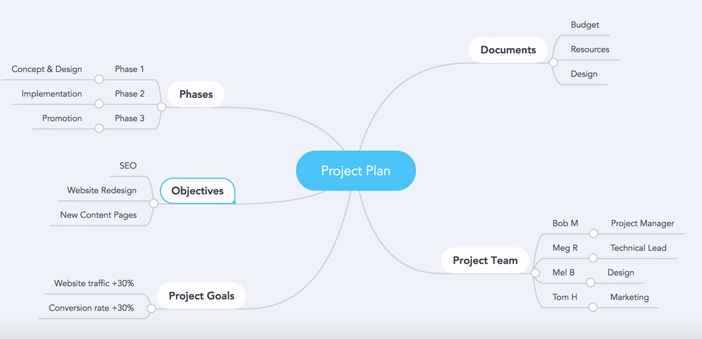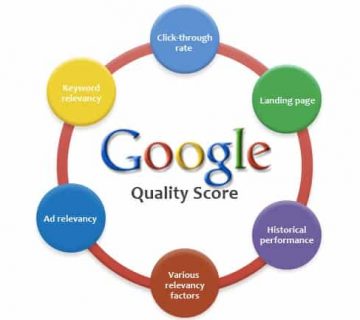5 things every SEO strategy needs
While every SEO strategy is – and should be – different, there is a key strategy for developing strategies. Below you will find five things that every SEO strategy needs to be successful.
1. Mind Map
A mind map is a way to build your strategy from the ground up. It’s just a branching set of categories, usually reaching out of center, moving from more general to more specific categories, with ideas becoming clearer.
It is not an illustration of your final strategy. The purpose of it, is not to help you present your plan, but to help you think about it.
Mind maps are tools that help you visualize your thinking process in a way that makes it easy for you to combine ideas, helping you see how they fit together. They help reduce the burden your strategy places on your working memory so you can focus on thinking and reflection.
You can use a tool like Mind Meister, or you can simply record your ideas as they come to you in visual form.
The main advantage of using a mind map is its ability to help you think in a non-linear way.
It allows you to see everything at once, in a networked structure that looks like your real brain works, so we highly recommend using one as you develop your SEO strategy.

2. Visual Representation
As your strategy becomes more specific, you will need a more professional design than the mind map you have created.
This means that you have goals, specific tasks associated with those goals, some tasks that take precedence over others, repetitive tasks that will need to be perfected, and others of lesser importance that will become numerous and more specific as time goes on.
You need to be able to present all this quickly and easily to your customer and teams, and you have to do it in a form simple enough for all parties to understand and process.
You can use Google Sheets, Trello, Workzone, Basecamp or whatever you prefer. This tool is not as important as the method for its use.
It should be immediately clear to all parties how to read the plan and make changes if necessary. It should also be clear:
- Which task is entrusted to whom
- Which tasks follow first
- What tasks are running, planned, in progress and which are completed.
3. Better understanding of the company
Whether you are an internal or outsourced SEO, you need to have a good understanding of the company in order to make any SEO strategy successful. You need to know what advantages you can take to get the most SEO value, what tactics will work best for the company, and the obstacles you will encounter.
Here are some of the most important factors to keep in mind when developing your strategy:
What is so special about the company selling the product?
We can refer to a single product line or a single product, but whatever the case, we need to know what makes our company different in order for any strategy to work. This will have a profound effect on the types of viewers that make sense, the kind of viewers we want to cultivate, the type of keywords we’ll be watching and much more.
What is the vision of the company?
We need to go deeper than which industry we are in and that we want to be profitable if we are to rank high in search engines. Look for ideas that will guide your strategic goals and metrics. If your company vision does not do this for you, you may want to consider developing a new vision for your campaign that serves the purpose.
Where exactly is the company falling behind?
This is one of those things that may seem like you can avoid early on, but you will always crawl and deconstruct an SEO strategy (or department or partnership) if it is not neutralized. Understand what the company really needs to see and really can’t accommodate before committing to a strategy.
4. Understanding your audience
You need to know who your audience is and that means a lot more than what your keywords are looking for.
Here are some things you need to identify, talking to your customer or observing your audience and much more:
What is their level of knowledge?
Do you talk to people who know everything about their subject and will laugh at anyone trying to share introductory material? Are you talking about people who need introductory material?
How close are they to the industry?
Is it your Common Consumers (B2C) or Businesses (B2B)? Are these people familiar with your industry, or not at all? Are they interested in understanding more about the industry, or are they just concerned about how they can benefit from your products?
5. Exact goals
In order for the goal to be useful, it must be accurate and in order to be accurate, we must be careful with the measurements and goals of the KPIs.
Yes, we want revenue to go up faster than costs, and yes, it may be useful to set an economic goal. We definitely need to set goals that have time limits.
However, one strategy is to achieve goals that have a specific impact on the business, its direction and future, and how the business itself operates. This means that our measurements must reflect what is happening to the business itself. This could mean links and recognition, could mean rankings, or could mean more organic search traffic.
The point is that everyone has to agree on what measurements make sense and why.
We firmly believe in the value of goal-oriented goals relative to KPI goals. This is because, especially when it comes to inbound marketing and SEO, our impact on KPIs is indirect. For this reason, I believe in setting project goals, contributing to those goals, measuring the impact and adapting the strategy in response.
This is an approach that is more likely to lead to knowledge and actual optimization, as opposed to finding ways to handle KPIs, without considering the long-term impact.
In conclusion
Almost any SEO strategy can benefit from these five elements mentioned above. If you need help with your business and your SEO strategy, we are here for you.

